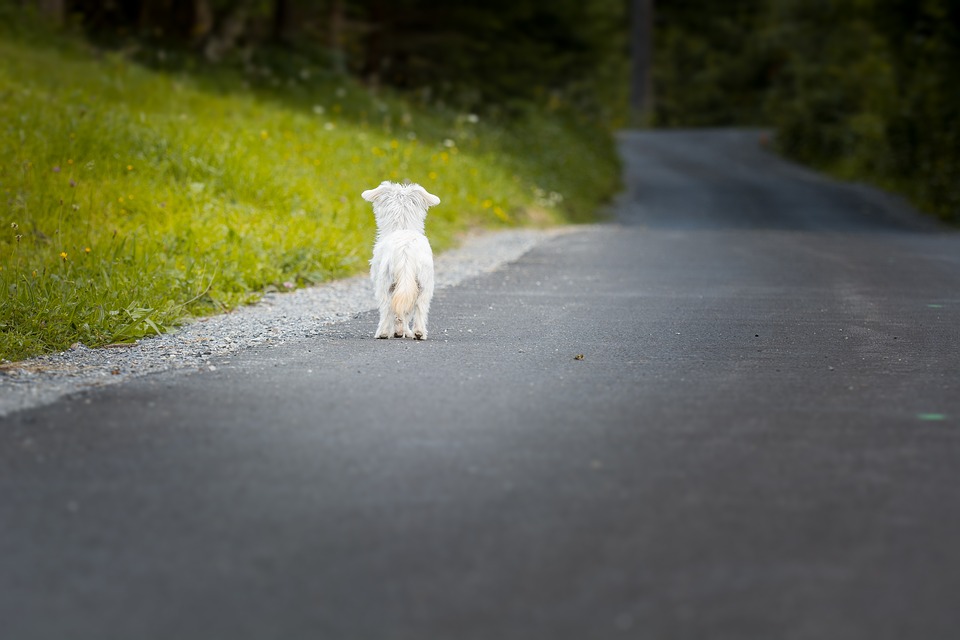
Newly Adopted or Fostered Dogs That Are a “High Flight Risk”
More and more people are choosing to adopt their new best friend from a rescue or shelter. This is a wonderful thing! Many dogs, through no fault of their own, need a new home. Unfortunately, though, many people are unprepared for the challenges of living with a newly adopted dog who may be shy, fearful, or stressed due to the changes in their lives. We consider these dogs as “high flight risk”. They go missing with alarming frequency from either their new owner or a foster family. Owners bring home their new dog; and then many of these dogs who are already stressed slip out of their collars, the yard, or the house.
By far, the greatest risk to these dogs when they go missing is that they will be hit by a car and killed. It happens far too often, and I wrote this article to give you tips to help you safely capture your new pet. Although it sounds like a horrifying situation and many people panic, the good news is that with a calm, clear head and a good plan of action these dogs are usually quite predictable in their actions and can be successfully recovered.
Although we never say never, please consider these tips:
- These dogs do not generally travel very far. They often stay VERY close to the spot where they went missing. We find this to be true even if they are unfamiliar with their new location. They generally do not head for an old home or shelter. They also don’t set off on long journeys unless someone chases or pressures them.
- The MOST important thing you can do is to spread the word to everyone that is helping you to NOT call, whistle, approach, or pursue your dog. You need to lure the dog back to the spot it went missing from. Just as if you were trying to lure a scared cat, or tame a wild animal like a squirrel or chipmunk.
- Using scent articles will help keep the dog in the area. Those items are the dog’s bed, his kennel or crate, toys, and dirty articles of clothing or bedsheets from the person most bonded with the dog. If the dog is not yet bonded with you, you may want to ask the shelter (or rescue) to provide clothing of the person that cared for him. That might be a kennel attendant or foster parent.
- If the dog had a kennel mate ask if you can rub an old towel over that dog to use as a scent item also. Place the scent articles somewhere safe (well away from roadways) along with smelly, tasty food and water. When hunters lose a dog, they leave their coat out on the ground at the place they last saw their dog. The dog is often lying on it when the hunter returns the next day.
- If you see your dog, immediately sit down on the ground and toss a few tasty treats out around you. It may take a few minutes or a few hours, but your dog might approach you. He may circle around and approach you from behind. Be patient and speak softly or not at all. Do not be surprised if he does not respond to his name. Newly adopted stressed dogs do not usually respond to sound or sight. They respond best to the smell of familiarity.
- Flyer the area heavily and use intersection signs to alert passing motorists about your missing dog. Again, remember to stress “Do NOT Chase” on your flyers and signs. The greatest risk to a shy lost dog is that he will be chased into traffic and killed.
- Be patient. Lost dogs from a new or foster home may hunker down for a day or two. They creep back out to where they went missing from due to the tasty food and scent items you left.
Please read through the rest of our articles on Shy Lost Dog Strategies. If shelter, rescue staff, and volunteers are helping you, please ask them to read through our series Harnessing the Energy to give them pointers on how to most effectively use their time. Never give up! Your lost dog is counting on you to bring him safely home.
Create your free lost pet listing with our partner www.petfbi.org. Your dog’s listing will be posted to the appropriate state or province Facebook page by a volunteer.
12-11-20
